初中中考英语知识点考点总结(全)
中考英语知识点全汇总
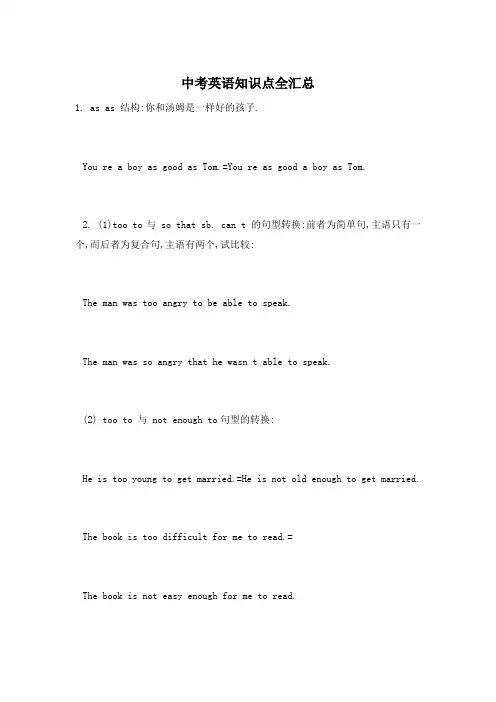
中考英语知识点全汇总1. as as 结构:你和汤姆是一样好的孩子.You re a boy as good as Tom.=You re as good a boy as Tom.2. (1)too to与 so that sb. can t 的句型转换:前者为简单句,主语只有一个,而后者为复合句,主语有两个,试比较:The man was too angry to be able to speak.The man was so angry that he wasn t able to speak.(2) too to 与 not enough to句型的转换:He is too young to get married.=He is not old enough to get married.The book is too difficult for me to read.=The book is not easy enough for me to read.3. 形容词原级表示比较级含义:约翰不象迈克那么苯.John is not so stupid as Mike.John is less stupid than Mike.John is cleverer than Mike.4. 用比较级表示最高级:约翰是班里最高的男生.John is taller than any other boy in the class.John is the tallest boy in the class.5. the more .. the more .表示越越 :The more books you read, the wider your knowledge is.The more food you eat, the fatter you are.6. more and more .表示越来越 :More and more students realized the importance of a foreign language. Our country is getting stronger and stronger.二.中考考点词组1. after, in 这两个介词都可以表示 (时间)以后的意思after 以过去为起点,表示过去一段时间之后,常用于过去时态的句子中?如:She went after three days. 她是三天以后走的in 以现在为起点,表将来一段时间以后,常用于将来时态的句子中如:She will go in three days. 她三天以后要走2. how long, how often, how soonhow long指多长时间,主要用来对一段时间(如three days, four weeks 等)提问?如:How long ago was it? 这是多久前的事了?how often指每隔多久,主要用来对频率副词或状语(如once a week等)提问?如: How often does he come here? Once a month. 他(每隔)多久来一次?每月一次.how soon指再过多久,主要用来对表示将来的一段时间(in an hour, in two weeks 等)提问?如:How soon can you come? 你多快能赶来?3. few, a few, little, a little, several, somefew 和little的意思是否定的,表示很少或几乎没有而a few和a little 的意思是肯定的,表示有一些,有一点儿few 和 a few修饰可数名词;little 和 a little 修饰不可数名词several用于修饰可数名词,语意比a few和some更肯定,含有好几个的意思some可修饰可数名词,也可修饰不可数名词,从数量上说,它有时相当于a few 或 a little,有时指更多一些的数量4. the other, anotherthe other 指两个人或事物中的另一个 ,表示特指?如:We stood on one side of the road and they stood on the other. 我们站在街这边,他们站在那边another着重于不定数目中的另外一个 ,表示泛指,所以常用来指至少三个中的一个?如:She has taken another of my books. 她已经拿了我的另外一本书5. spend, take, cost, payspend的宾语通常是时间?金钱?在主动语态中,句子的主语必须是人,而且后面不能用动词不定式做它的宾语?如:She spent the whole evening in reading. 她把整个晚上用来读书take常常用来指花费时间,句子的主语通常是表示事物的词语?如:How long will this job take you?你做这项工作要花多长时间?cost 指花费时间?金钱或力气等,只能用表示事物的词做主语,并且不能用于被动语态?如:How much does the jacket cost?这件夹克多少钱?pay 主要指主语(某人)买某物(或为某事)付多少钱(给某人)?如:I pay for my rooms by month. 我按月支付租金6. among, betweenbetween 的意思是在中间,在之间 ,一般指在两者之间?如:There is a table between two windows. 在两扇窗户之间有一张桌子.between 有时也表示在多于两个以上的事物之间,但那是指在每二者之间.如:the relationship between different provinces and municiplities 省市和省市之间的关系(这里是指每两个省市之间的相互关系?)7. beat, win这两个词都有获胜,打败的意思,但其后宾语不同?beat是打败,优于的意思,后面接人或队?如:We beat them. 我们打败了他们.win指赢,获胜 ,后面接比赛?名次?如:We won the match/game/race/the first place. 我们赢了这场比赛(获得了第一名).8. agree with, agree on, agree toagree on表示就取得一致意见 ?如:We all agree on (making) an early start. 我们一致同意及早出发?agree with表示与意见一致 ,后面既可以跟表示人的名词或人称代词,也可以跟表示意见.看法的名词或what引导的从句?.如:I agree with you without reservation.我毫无保留地同意你的意见.We agree with what you said just now.我们同意你刚才所说的意见.agree to后面不能接人,只能接提议,计划,方案等词句?如:I agree to the terms proposed. 我同意拟议的条件.9. bring, take, carry,fetch这四个词都是动词,都含有带或拿的意思,但使用的场合各不相同.bring作带来,拿来解?如:Ne_t time don t forget to bring me a copy of your work. 下次不要忘了把一份你的作品带给我.take是bring的对语,作带去,拿去解?如:Take the bo_ away, please. 请把盒子拿走.carry表示运载,携带之意,运送的方式很多,可以用车.船,也可以用手甚至用头.如:This bus is licensed to carry 1_ passengers. 这辆巴士准载一百人.fetch则表示去拿来的意思.如:Please fetch me the uments in that room. 请到那间房间去把文件拿来给我._. each, every两词都是每个的意思,但着重点不同.each着重个别的情况,every着重全体,有所有的的意思.如:She knows each student of the class.她认识这个班里的每一个学生.She knows every student of the class.她认识这个班所有的学生._. no one, noneno one指没有人(只能指人,不能用来指物) ,意思与nobody相同,作主语时不必跟of连用,如:No one believes him since he is not honest. 没有人相信他,因为他不诚实.No one else but I went. 除我以外,谁也没去.none指一个也没有(既可指人,也可指物) ,作主语时代替不可数名词,谓语动词用单数形式;代替可数名词,谓语动词用单.复数都可以.但在主+系+表结构中,如果表语为复数,则系动词要用复数形式.如:None of us are(is) afraid of difficulties. 我们谁也不怕困难._. go on doing, go on to do, go on with这三个动词短语都有继续做某事的意思,其区别如下:go on doing表示继续做,一直在做某事(中间无间断) go on to do表示接着做某事 ,即某事已做完,接着做另一件事;go on with也表示继续做某事 ,其含义是某一动作一度中止后,又继续下去._. too much, much too二者都有太,非常之意,much too为副词词组,修饰形容词?副词,不可修饰动词.如:It s much too cold.天气实在是太冷了.too much作太多讲,有以下三种用法?(1)作名词词组如:You have given us too much. 你给我们的太多了.(2)作形容词词组修饰不可数名词如:Don t drink toomuch wine. 不要饮太多的酒(3)作副词词组修饰不及物动词如:She talks too much. 她说话太多_. happen, take place与occurhappen有偶然的意思,多用于客观事物?情况的发生?.如:Whatever has happened to your arm? It s all swollen. 你的手臂怎么了?肿得好历害!occur 指有计划地使某些事发生 ,有时强调呈现于人的知觉中.如:Did it occur to you to phone them about it?你难道没想到就这事给他们打个电话?事件作主语时,happen和occur可以通用?如:The accident happened/occurred yesterday. 事故是昨天发生的.take place 指事件发生,但常用来表示举行的意思,带有非偶然性?例如:The meeting took place last night.会议昨晚举行._. in front of, in the front ofin front of的意思是在前面 .如:There is a tree in front of the house.房子前面有一棵树.in the front of的意思是在前部 ,指在某个空间范围内的前面.如:There is a blackboard in the front of the classroom. 教室里前部有一块黑板_. noise, voice, sound这三个词都作声音解,在表示听到声音这个意思时,三者可以通用,但它们又各有特定的含义.sound 作声音解,含义最广,指可以听到的任何声音,如:a weak sound 微弱的声noise作噪音,嘈杂声,吵闹声解,指不悦耳,不和谐的声音,它既可作可数名词,也可作不可数名词.如:Another kind of pollution is noise. 另外一种污染是噪音.voice 作声音解时,多指人发出的声音,包括说话声.歌声和笑声.如:He shouted at the top of voice. 他高声呼喊.有时也用于引申意义,作意见.发言权解.如:I have no voice in the matter. 对于这件事,我没有发言权._. arrive, get, reach三者均可表示到达 ,arrive后通常接介词at(一般用于较小的地方)或 in(一般用于较大的地方)?如:We arrived at the station five minutes late. 我们晚了5分钟到车站?又如:They will arrive in Paris ne_t Monday. 他们将于下周星期一到达巴黎?get之后通常接介词to.如:When we got to the park, it began to rain. 我们到达公园时,就开始下雨了.reach是及物动词(较 get更正式),其后可直接跟地点名词做宾语(不能用介词).如:He reached Beijing yesterday. 他昨天到达北京.三.情态动词1.考查情态动词表示推测的用法[考点快忆] 表示肯定推测的情态动词有:must 一定;准是 ,may 也许;可能 ,might 或许表示否定推测的情态动词有:can t 不可能 , couldn t 不会 ,may not 也许不 ,might not 或许不 can表示推测时不用于肯定句,may表示推测时不用于疑问句.2.考查情态动词引起的一般疑问句的答语[考点快忆] 回答must时,肯定答语用must,否定答语用needn t或don t have to.回答need时,肯定答语用must,否定答语用needn t.回答may时,肯定答语用may,否定答语用mustn t 或can t.3.考查情态动词的意义[考点快忆] must 必须 have to 不得不 need 必须;需要 can(could) 能;可能 may (might) 可以;可能 shall,will (would) 将;会;愿意;要 should 应当 .had better (not) + 动词原形表示建议;have to / has to / had to的否定,疑问形式要借助于助动词do / does / did.四. There be 的句子结构There be是一个存在句型,表示有的意思,肯定句的形式为:There be + 名词(单数或复数)+地点状语或时间状语.be动词单复数的确定,看be后边第一个名词,当所接主语为单数或不可数名词时,be动词形式为is;当所接主语为复数名词时,be动词为are;当be动词后接两个以上主语时,be动词与最临近主语保持数上的一致.意思为某地有某人或某物 .如:There is an eraser and two pens on the desk. 桌子上有一块橡皮和两支钢笔.There are two pens and an eraser on the desk. 桌上有两支钢笔和一块橡皮.(1)there be的否定句,即在be的后面加上not.否定形式为:There be + not + (any) + 名词+地点状语.There is not any cat in the room. 房间里没猫.There aren t any books on the desk. 桌子上没书.(2)there be句型的疑问句就是将be提到句首:Be there + (any) +名词+地点状语肯定回答:Yes, there is / are. 否定回答:No, there isn t / aren t. -Is there a dog in the picture?画上有一只狗吗-Yes, there is. 有.-Are there any boats in the river?河里有船吗-No, there aren t. 没有.(3)特殊疑问句:How many . . . are there (+地点状语)某地有多少人或物回答用There be . . .There s one. / There are two / three / some . . .有时直接就用数字来回答.One. / Two . . .-How many students are there in the classroom?教室里有多少学生-There s only one. / There are nine. 只有一个./有九个.(4)如果名词是不可数名词,用:How much + 不可数名词 + is there + 地点状语How much water is there in the cup?杯中有多少水五. 中考对定语从句的考查:1.定语从句的功用和结构在复合句中,修饰某一名词或代词的从句叫做定语从句.被定从句修饰的词叫做先行词.定语从句必须放在先行词之后.引导定语从句的关联词有关系代词和关系副词.例如:This is the present that he gave me for my birthday2.关系代词和关系副词的功用关系代词和关系副词用来引导定于从句,在先行词和定语从句之间起纽带作用,使二者联系起来.关系代词和关系副词又在定语从句中充当一个成分.关系待客做主语,宾语,定语,关系副词可作状语.1. 作主语:关系代词在定语从句中作主语时,从句的谓语动词的人称和数须和先行词一致.例如:I don t like people who talk much but do little.The cars which are produced in Hubei Province sell very well.2. 作宾语:She is the person that I met at the school gate yesterday.The book that my grandmother gave me is called The Great Escape .3. 作定语关系代词whose在定语从句中作定语用.例如:What s the name of the young man whose sister is a tor?The girl whose father is a teacher studies very hard.4. 作状语I ll never forget the day when I first came to Beijing.三. 各个关系代词和关系副词的具体用法1. who 指人,在定语从句中作主语.例如:The person who broke the window must pay for it.The boy who is wearing the black jacket is very clever.2. whom指人,在定语从句中作宾语.例如:Do you know the young man (whom) we met at the gate?Mr Lee (whom) you want to see has come.3. whose 指人,在定语从句中作定语.例如:The girl whose mother is ill is staying at home today.I know the boy whose father is a professor.4. which指物,在定语从中作主语或宾语.例如:A dictionary is a book which gives the meaning of words.Here is the book (which) the teacher mentioned yesterday.5. that多指物,有时也指人,在定语从句中作主语或宾语.例如:I ve read the newspaper that(which) carries the important news. Who is the person that is reading the newspaper over there?6. when 指时间,在定语从句中作状语.例如:I ll never forget the time when we worked on the farm.He arrived in Beijing on the day when I left.7. where 指地点,在定语从句中作状语.例如:This is the house where we lived last year.The factory where his father works is in the east of the city.四. 关系代词 whom, which 在定语从句中作介词宾语时,可以和介词一起放于先行词与定语从句之间,有时为了关系紧凑也可以将 whom 与 which 与先行词紧挨着书写,而将介词置于定语从句的后面,如:That was the room in which we had lived for ten years. = That was the roomwhich we had lived in for ten years.五. 具体使用时还要注意下列问题:1. 只能使用that,不用which 的情况:(1) 先行词是all, few, little, nothing, everything, anything 等不定代词时.例如:All that he said is true.(2) 先行词被only, no, any, all,等词修饰时.例如:He is the only foreigner that has been to that place.(3) 先行词是序数词或被序数词修饰的词.例如:He was the second (person) that told me the secret.(4) 先行词是形容词最高级或被形容词最高级修饰的词.This is the best book (that) I have read this year.(5) 先行词既包括人又包括物时.例如:He talked about the people and the things he remembered.2. 只能用which,不用that 的情况:(1) 在非限制性定语从中.例如:The meeting was put off, which was e_actly what we wanted.(2) 定语从句由介词+关系代词引导,先行词是物时.例如:The thing about which he is talking is of great importance.。
中考英语重要知识点总结
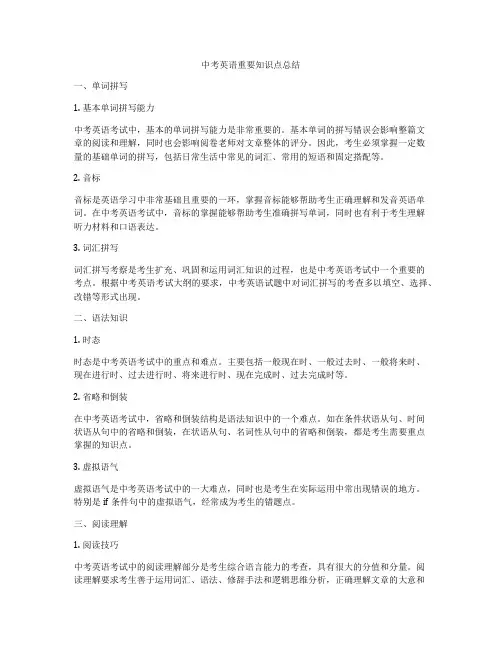
中考英语重要知识点总结一、单词拼写1. 基本单词拼写能力中考英语考试中,基本的单词拼写能力是非常重要的。
基本单词的拼写错误会影响整篇文章的阅读和理解,同时也会影响阅卷老师对文章整体的评分。
因此,考生必须掌握一定数量的基础单词的拼写,包括日常生活中常见的词汇、常用的短语和固定搭配等。
2. 音标音标是英语学习中非常基础且重要的一环,掌握音标能够帮助考生正确理解和发音英语单词。
在中考英语考试中,音标的掌握能够帮助考生准确拼写单词,同时也有利于考生理解听力材料和口语表达。
3. 词汇拼写词汇拼写考察是考生扩充、巩固和运用词汇知识的过程,也是中考英语考试中一个重要的考点。
根据中考英语考试大纲的要求,中考英语试题中对词汇拼写的考查多以填空、选择、改错等形式出现。
二、语法知识1. 时态时态是中考英语考试中的重点和难点。
主要包括一般现在时、一般过去时、一般将来时、现在进行时、过去进行时、将来进行时、现在完成时、过去完成时等。
2. 省略和倒装在中考英语考试中,省略和倒装结构是语法知识中的一个难点。
如在条件状语从句、时间状语从句中的省略和倒装,在状语从句、名词性从句中的省略和倒装,都是考生需要重点掌握的知识点。
3. 虚拟语气虚拟语气是中考英语考试中的一大难点,同时也是考生在实际运用中常出现错误的地方。
特别是if条件句中的虚拟语气,经常成为考生的错题点。
三、阅读理解1. 阅读技巧中考英语考试中的阅读理解部分是考生综合语言能力的考查,具有很大的分值和分量。
阅读理解要求考生善于运用词汇、语法、修辞手法和逻辑思维分析,正确理解文章的大意和细节,抓住文章的主题和各种细节,辨别文章的褒贬和观点,理解上下文的关系,推理出文章的逻辑,猜测词义等。
2. 阅读能力提升阅读能力的提升是考生成功通过中考英语考试的关键之一。
阅读理解部分的题目主要考查考生对英语文章的快速理解和分析能力,所以考生必须多读英语文章,提高自己的阅读量和速度。
四、写作能力1. 作文内容中考英语作文通常要求考生根据一定的题目要求进行写作,要求考生的内容要贴合主题,条理清晰,表达流畅。
人教九年级全册中考英语语法考点总结 中考必备知识点
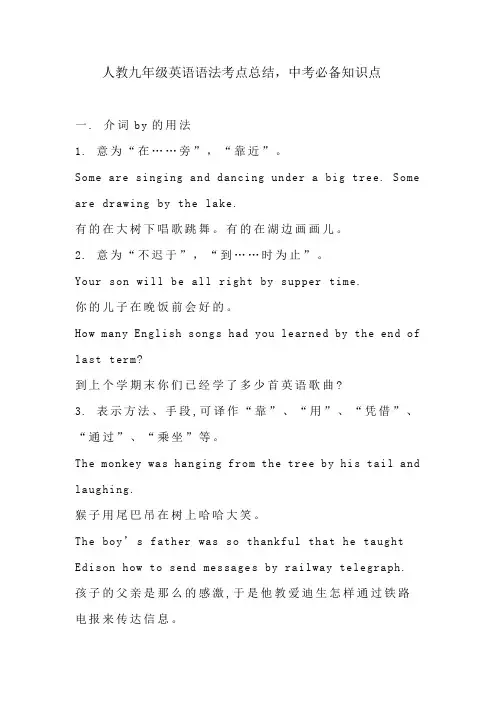
人教九年级英语语法考点总结,中考必备知识点一. 介词by的用法1. 意为“在……旁”,“靠近”。
Some are singing and dancing under a big tree. Some are drawing by the lake.有的在大树下唱歌跳舞。
有的在湖边画画儿。
2. 意为“不迟于”,“到……时为止”。
Your son will be all right by supper time.你的儿子在晚饭前会好的。
How many English songs had you learned by the end of last term?到上个学期末你们已经学了多少首英语歌曲?3. 表示方法、手段,可译作“靠”、“用”、“凭借”、“通过”、“乘坐”等。
The monkey was hanging from the tree by his tail and laughing.猴子用尾巴吊在树上哈哈大笑。
The boy’s father was so thankful that he taught Edison how to send messages by railway telegraph. 孩子的父亲是那么的感激,于是他教爱迪生怎样通过铁路电报来传达信息。
4. 表示“逐个”,“逐批”的意思。
One by one they went past the table in the dark.他们一个一个得在黑暗中经过这张桌子。
5. 表示“根据”,“按照”的意思。
What time is it by your watch?你的表几点了?6. 和take , hold等动词连用,说明接触身体的某一部分。
I took him by the hand.我拉住了他的手。
7. 用于被动句中,表示行为主体,常译作“被”、“由”等。
English is spoken by many people.英语被许多人说。
初中英语中考考点词汇精讲(共10个)
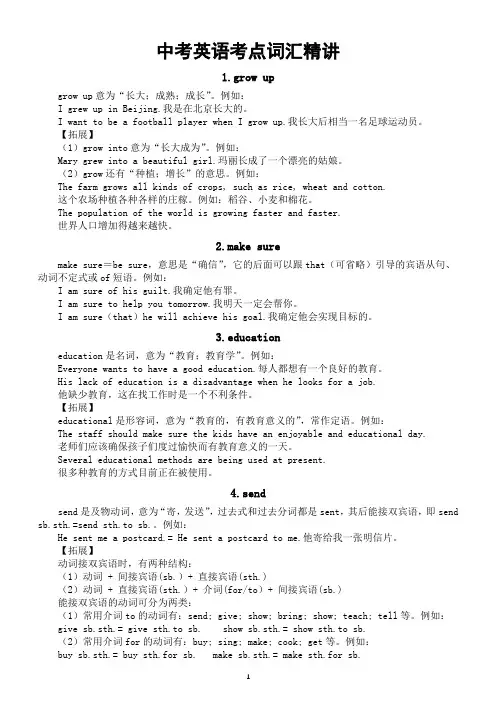
中考英语考点词汇精讲1.grow upgrow up意为“长大;成熟;成长”。
例如:I grew up in Beijing.我是在北京长大的。
I want to be a football player when I grow up.我长大后相当一名足球运动员。
【拓展】(1)grow into意为“长大成为”。
例如:Mary grew into a beautiful girl.玛丽长成了一个漂亮的姑娘。
(2)grow还有“种植;增长”的意思。
例如:The farm grows all kinds of crops, such as rice, wheat and cotton.这个农场种植各种各样的庄稼。
例如:稻谷、小麦和棉花。
The population of the world is growing faster and faster.世界人口增加得越来越快。
2.make suremake sure=be sure,意思是“确信”,它的后面可以跟that(可省略)引导的宾语从句、动词不定式或of短语。
例如:I am sure of his guilt.我确定他有罪。
I am sure to help you tomorrow.我明天一定会帮你。
I am sure(that)he will achieve his goal.我确定他会实现目标的。
cationeducation是名词,意为“教育;教育学”。
例如:Everyone wants to have a good education.每人都想有一个良好的教育。
His lack of education is a disadvantage when he looks for a job.他缺少教育,这在找工作时是一个不利条件。
【拓展】educational是形容词,意为“教育的,有教育意义的”,常作定语。
例如:The staff should make sure the kids have an enjoyable and educational day.老师们应该确保孩子们度过愉快而有教育意义的一天。
中考考点_过去进行时知识点汇总(全)
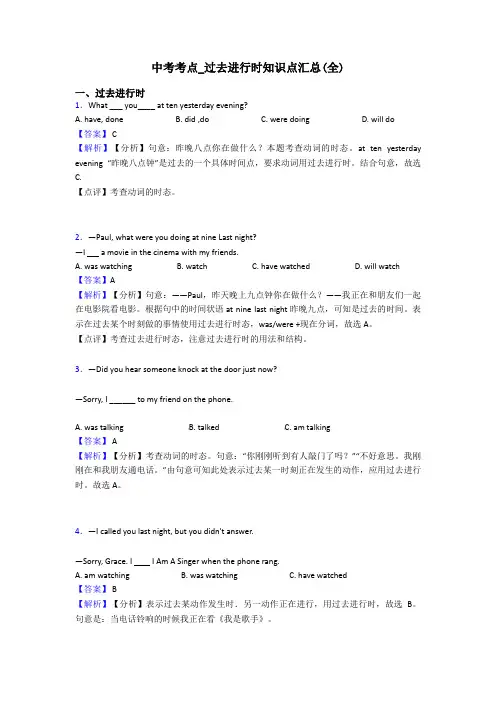
中考考点_过去进行时知识点汇总(全)一、过去进行时1.What ___ you____ at ten yesterday evening?A. have, doneB. did ,doC. were doingD. will do【答案】 C【解析】【分析】句意:昨晚八点你在做什么?本题考查动词的时态。
at ten yesterday evening “昨晚八点钟”是过去的一个具体时间点,要求动词用过去进行时。
结合句意,故选C.【点评】考查动词的时态。
2.—Paul, what were you doing at nine Last night?—I a movie in the cinema with my friends.A. was watchingB. watchC. have watchedD. will watch【答案】A【解析】【分析】句意:——Paul,昨天晚上九点钟你在做什么?——我正在和朋友们一起在电影院看电影。
根据句中的时间状语at nine last night昨晚九点,可知是过去的时间。
表示在过去某个时刻做的事情使用过去进行时态,was/were +现在分词,故选A。
【点评】考查过去进行时态,注意过去进行时的用法和结构。
3.—Did you hear someone knock at the door just now?—Sorry, I ______ to my friend on the phone.A. was talkingB. talkedC. am talking【答案】 A【解析】【分析】考查动词的时态。
句意:“你刚刚听到有人敲门了吗?”“不好意思。
我刚刚在和我朋友通电话。
”由句意可知此处表示过去某一时刻正在发生的动作,应用过去进行时。
故选A。
4.—I called you last night, but you didn't answer.—Sorry, Grace. I I Am A Singer when the phone rang.A. am watchingB. was watchingC. have watched【答案】 B【解析】【分析】表示过去某动作发生时.另一动作正在进行,用过去进行时,故选B。
初中英语中考考点大汇总
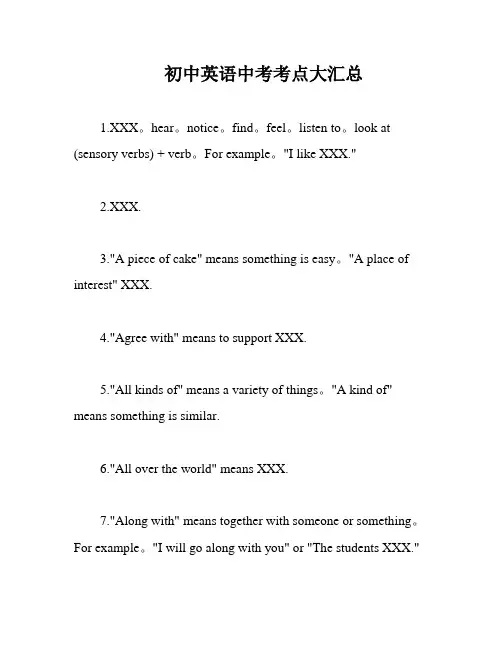
初中英语中考考点大汇总1.XXX。
hear。
notice。
find。
feel。
listen to。
look at (sensory verbs) + verb。
For example。
"I like XXX."2.XXX.3."A piece of cake" means something is easy。
"A place of interest" XXX.4."Agree with" means to support XXX.5."All kinds of" means a variety of things。
"A kind of" means something is similar.6."All over the world" means XXX.7."Along with" means together with someone or something。
For example。
"I will go along with you" or "The students XXX."8."XXX.9."As you can see" means that someone is already aware of something.10."Ask for" means to request something directly。
For example。
"Can I ask you for my book?"11."Ask someone for something" means to request something from XXX.12."Ask someone to do something" means to request that someone do something。
2023年中考英语总复习英语精华知识点全汇总建议收藏
2023年中考英语总复习英语精华知识点全汇总建议收藏英语语法重点与难点> as…as…结构:You' re a boy as good as Tom.二You' re as good a boy asTom.你和汤姆是一样好的孩子。
1、(1) too…to与so…that sb. can' t…的句型转换:前者为简单句,主语只有一个,而后者为复合句,主语有两个:The man was too angry to be able to speak.The man was so angry that he wasn' t able to speak.(2)too…to…与not enough to句型的转换:He is too young to get married. =He is not old enough to get married.The book is too difficult for me to read.=The book isnot easy enough for me to read.2、形容词原级表示比拟级含义: 的知觉中。
如:Did it occur to you to phone them about it?你难道没想到就这事给他们打个?事件作主语时,happen和occur可以通用?如:The accident happened/occurred yesterday. 事故是昨天发生的。
take place指事件发生,但常用来表示“举行”的意思,带有非偶然性?如:The meeting took place last night.会议昨晚举行。
14.in front of, in the front of in front of的意思是“在前面”。
如:There is a tree in front of the house.房子前面有一棵树。
初中英语中考考点词汇精讲(共26个)
中考英语考点词汇精讲1.well&good两者都可以表示“好”的意思。
well是副词,用于修饰动词。
例如:Tom speaks Chinese well.汤姆的汉语说得好。
He sings well.他唱得好。
good是形容词,用作定语或表语。
例如:She is a good doctor.她是个好医生。
His pronunciation is very good.他的发音很好。
well作形容词时,指的是健康状况良好。
例如:He is quite well.他身体好。
I hope you will be well soon.我希望你很快好起来。
2.no&notno 表示“不”,修饰可数名词单数时no=not a; 修饰可数名词复数或者不可数名词时no=not any。
例如:I have no book.=I don’t have a book.I have no books.= I don’t have any books.There is no water in the cup.=There isn’t any water in the cup.no 常用来做否定回答,与yes相对应,not不可以。
例如:Do you like bananas? No, I don’t.不可以说Not, I don’t.not 用于否定句,放在助动词或者be动词后面表示否定,no 不可以。
例如:我们可以说I don’t like tea.不可以说I do no like tea.3.foodfood泛指“食物”,“食品”,通常用做不可数名词。
例如:I like Chinese food.我喜欢中国食品。
We should eat healthy food every day.我们每天应该吃健康食品。
food指食物的种类时是可数名词。
例如:Milk is a good food.牛奶是一种好食品。
Too many sweet foods, like cakes and pastry, may make you fat.太多的甜食,像蛋糕和点心,可能会使你发胖。
中考英语知识点归纳整理
中考英语知识点归纳整理初中时期的英语学习一定要形成良好的学习态度和学习习惯,要重视英语知识的学习,因为英语是我们中考必考的科目。
下面是整理的英语中考考点知识点,欢迎大家阅读分享借鉴。
目录英语中考知识点英语中考常考知识点英语中考考点英语中考知识点一、名词单复数加es构成复数的.名词:beach—beachesbox—boxesclass—classesglass—glasseshero—heroesmatch—matchespotato—potatoessandwich—sandwichestomato—tomatoeswatch—watches将f或fe改为v加es构成复数的名词:knife—knivesleaf—leaveslife—livesshelf—shelveswife—wiveswolf—wolves复数变化不规则的名词:child—childrenChinese—chinesefireman—firemenfish—fish/fishesfoot—feetJapanese—Japaneseman—menmouse—mice policeman—policemen postman—plstmen salesman—salesmensheep—sheeptooth—teethwoman—women返回目录英语中考常考知识点被动语态被动语态由助动词be加及物动词的过去分词构成,助动词be有时态,人称和数的变化。
被动语态的时态是由be的时态决定的,be是什么时态,全句就是什么时态,be动词后面的过去分词不变。
1、各种时态的被动语态结构如下:一般现在时的被动语态:主语+am / is / are (not)+过去分词一般过去时的被动语态:主语+was / were +过去分词现在完成时的被动语态:主语+have / has +been +过去分词一般将来时的被动语态:主语+will +be +过去分词过去将来时的被动语态:主语+would / should + be +过去分词过去进行时的被动语态:主语+was / were + being +过去分词过去完成时的被动语态:主语+had + been +过去分词情态动词的被动语态:情态动词+be+过去分词2、被动语态的用法(1)不知道或没有必要说明动作的执行者是谁,不用by+动作执行者短语。
(完整word版)全初中必背英语语法知识汇总
全!初中必背英语语法知识汇总语法是中考英语考试必考点。
语法知识掌握得好,将大大加快英语学习的进程。
本文归纳了词法和八种基本时态,希望对广大初中学子有所帮助。
词法名词(1)名词的可数与不可数可数名词指表示的人或事物可以用数来计量,它有单数与复数两种形式。
不可数名词指所表示的事物不能用数来计量。
不可数名词前一般不能用冠词a、an来表示数量,要表示“一个……”这一概念,须加a piece of这一类短语。
(2)可数名词复数的规则变化A.一般情况下加-sB.以s, x, ch, sh, 结尾的加-esC.以辅音字母加y结尾的改y为i再加-esD.以f,fe结尾,去掉f或fe,变v再加-es(3)名词的所有格①. 单数名词词尾加’s,复数名词词尾若没有s,也要加’s如:the worker's bike,the Children’s ball②.表示几个人共有一样东西,只需在最后一个人的名字后加’s若表示各自所有,则需在各个名字后’s如:This is Lucy and Licy’s room.These are Kate's and jack’s rooms.③. 如果是通过在词尾加—s构成的复数形式的名词,只加’。
如:the students’books,the girls’blouses代词(1)人称代词第一人称单数I me my mine myself复数we us our ours ourselves第二人称单数you you your yours yourself复数you you your yours yourselves第三人称单数 he him his his himselfshe her her hers herselfit it its its itself复数they them their theirs themselves(2)物主代词物主代词的用法:形容词性物主代词后面一定要跟上一个名词;名词性物主代词可作主语、表语、宾语。
- 1、下载文档前请自行甄别文档内容的完整性,平台不提供额外的编辑、内容补充、找答案等附加服务。
- 2、"仅部分预览"的文档,不可在线预览部分如存在完整性等问题,可反馈申请退款(可完整预览的文档不适用该条件!)。
- 3、如文档侵犯您的权益,请联系客服反馈,我们会尽快为您处理(人工客服工作时间:9:00-18:30)。
初中中考英语知识点考点总结一.修饰比较级时常见的错误1. more不可修饰比较级,但much可以用来加强比较级,意为"……的多,更……" He looks more younger than I. (×)He looks much younger than I. (√ )2. 比较的对象或范围出现错误。
1)The weather of Beijing is colder than Shanghai. (×)(比较的对象应该是上海的天气,而不是上海)The weather of Beijing is colder than that of Shanghai. (√)2)China is larger than any country in Asia. (×)(出现了逻辑上的错误: 中国就是亚洲国家,应当排除在外。
)China is larger than any country in Africa. (√)中国比非洲的任何国家都大。
China is larger than any other country in Asia. (√)中国比亚洲的任何(其他的)国家都大。
特别提示Than后面接代词时,一般要用主格,但在口语中也可使用宾格。
如果than后是一个句子,则不可使用宾格。
He works harder than me.He works harder than I do.二.形容词的比较级用于两者比较,表示"比…更…":"A+系动词+形容词比较级+than+ B,e.g. I am two years older than my little sister."A+谓语动词+副词比较级+than+ B:e.g. She gets to school earlier than the other students."比较级+and+比较级",这种结构表示事物本身程度的逐渐增长,意为"越来越…"。
eg. In spring the days are getting longer and longer."the+比较级…the+比较级",表示一方的程度随着另一方的程度的增长而增长,表示"越…,越…"。
eg. The mort you practice using English,the better you'll learn it 你英语练得越多,就会学得越好。
"A十动词十the+比较级+of短语(比较范围)",这种结构表示"两者中更……的那一个"。
当比较双方只出现一方(没有than及其后面的部分),且句中含有of the two……时,比较级前要加the.eg. Penny is the taller of the two girls.The larger of the two houses belongs to Mr. Black.表示两者程度不同的其他方式可用more than(多于……),not more than(不多于……),less than(少于……),not less than(不少于……),less+形容词+ than(不如……)等。
We haven't got more than one hour left right now.It is less cold today than it was yesterday."not+比较级+than"与"no+比较级+than" 这两个结构表达的意思完全不同:前者往往表示"一方不比另一方……",后者往往表示"前者和后者一样都不…";修饰说明数量时,前者表示"最多,不比……多",后者表示"仅仅",带有感情色彩。
I am not taller than you. 我不比你高。
I am no taller than you. 我和你一样高。
My French is not better than yours.My French is no better than yours.She is not more than seven years old.She is no more than seven years old.三.形容词的最高级最高级是表示在三者或更多者中程度最高的比较方式the+ 形容词最高级+名词+表示范围的短语或从句Jack is the tallest student in his class.He is the fastest runner of the three boys.This is the most boring book I've ever read.one of the+形容词最高级+名词复数+表示范围的短语或从句China is one of the largest countries in the world.用法比较:介词in和of引导的短语说明比较的范围如果在一定的地域空间内进行比较用in; 如果在同一类事物范围内进行比较用of.China is the largest country in Asia.China is the largest one of all the Asian countries.运用比较级表达最高级的概念:"比较级+than any other+名词单数","比较级+than the other+名词复数"或"比较级+than the rest of +the+名词复数"Julia is taller than any other girl in her class.= Julia is taller than the other girls in her class. = Julia is taller than the rest of the girls in her class.四.表示移动方向的介词(1)to表示“向,往到”。
如:He will drive to Nanjing. 他将开车去南京。
(2) from表示“自,从,来自”。
如:Where are you from 你是哪儿人I am from Jiangsu Province. 我是江苏人。
(3)up表示“向……上,往上”。
如:Mr. Smith used a lift to go up and down. 史密斯先生乘电梯上下。
( 4)down表示“向……下,沿着……往下”。
如:Go down the street then you’ll find the shop. 沿着这条街走,你就会发现那个商店。
(5)round表示“环绕,围绕”如:The students are running round the playground. 学生们正绕着操场跑步。
(6)across表示“横过,穿过,跨过”。
如:A boy walked across the park just now. 一个男孩刚才穿过公园。
(7)through表示“通过,穿过(空间)”。
如:The river ran through the city. 那条河从城中流过。
(8)over表示“越过,从……上边过去”。
如:There is a bridge over the river. 河上有座桥。
五.相似介词组辨析1)貌似相同的in front of与in the front ofin front of“在......的前面”,指从外部看来一物在另一物的前面。
如:There’s a big tree in front of the building.in the front of“在......的前面”,指从内部看来一物在另一物的前部。
如:The driver sits in the front of the car.2)貌似相同的in time与on timein time意思是“及时”,指在时间上有提前、刚好的意思,表示正赶上时候或恰在需要的时候,作表语时常与for sth.或to do sth. 连用。
如:We’re just in time to catch the bus.on time意思是“按时、准时”,通常指有时间限制,以规定的时间为界,在规定时间内即为按时。
如:We should get to school on time.The train arrived on time.3)貌似相同的beside与besidesbeside表示位置,意思是“在......的旁边”,与by,at同意。
如:There is a big tree beside the house.besides意思是“除了......以外,还......”与except,but同义。
如:The girl is studying Japanese besides English.六.but:但是,可是,而He is old,but he looks very young.他老了,但他看起来很年轻。
Li Li likes violin but doesn't like piano.李莉喜欢小提琴,(但是)不喜欢钢琴。
(but 后面省略了主语Li Li,因为与前面的主语成分相同)Mary likes violin,but Tom doesn't.玛丽喜欢小提琴,而汤姆不喜欢。
(doesn't后面省略了like violin,因为与前面的成分相同)He isn't a teacher but a doctor.他不是(一个)老师,而是医生。
They came here not for money but for the life.他们到这儿来,不是要钱,而是要命。
注意:but所连接的句子,句中如果某些成分与前面相同,则可以省略。
七.or:或,或者,否则Is Li Ming from Beijing or from Shanghai.李明是北京人还是上海人呢?1.基本用法or表示“~或”的意思,使用于两者之中选择一个的时候。
Would you like coffee or tea?你喜欢咖啡还是茶?Tom or I am right.我或者汤姆是对的。
Li Ming or his classmates are cleaning the room.李明或者是他的同班同学在打扫房间。
